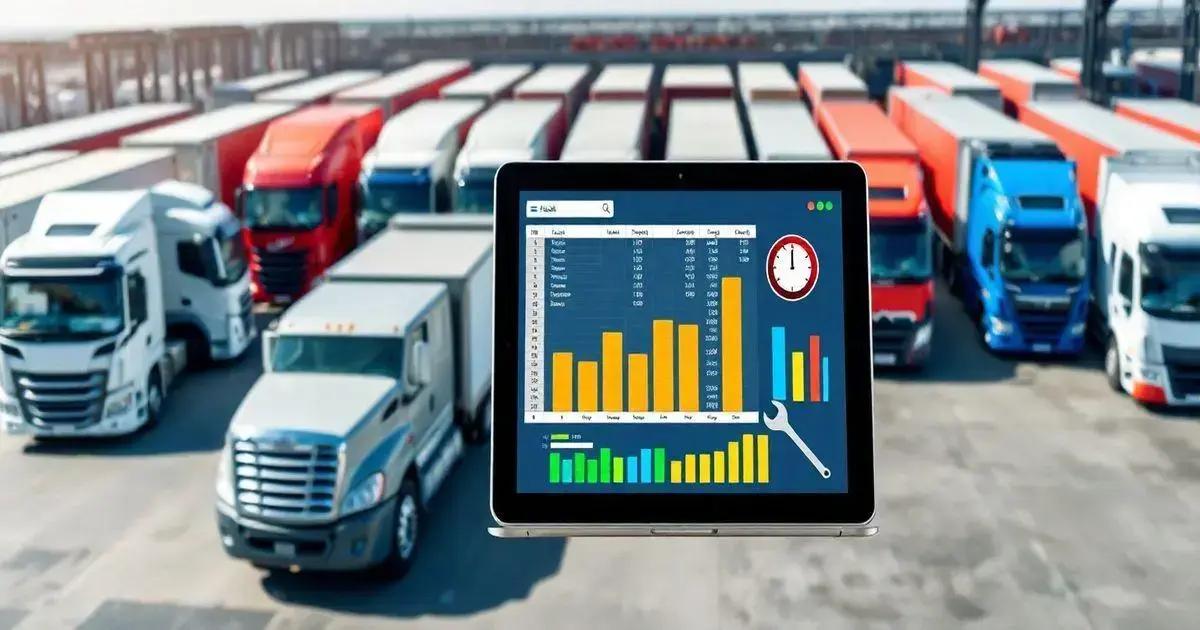Unlock Fleet Management Success with Fleet Control Worksheet 7.0 Leave a comment
The Fleet Control Worksheet 7.0 is an advanced fleet management tool that offers features for tracking vehicle metrics, managing driver and vehicle documentation, controlling travel expenses, and ensuring proper vehicle maintenance. It provides insights through yearly performance analysis, enabling fleet managers to optimize operations and reduce costs effectively.
Are you tired of the chaos that comes with managing a fleet? Look no further! The Fleet Control Worksheet 7.0 is here to revolutionize your fleet management. This comprehensive tool allows you to track everything from fuel consumption to maintenance schedules, ensuring your fleet operates smoothly and efficiently.
Whether you’re overseeing a small team of vehicles or a vast array of trucks, this spreadsheet is designed to help you stay organized, save time, and ultimately reduce costs. Let’s dive into the features that make this worksheet a must-have for any fleet manager.
Initial Dashboards Overview
The Fleet Control Worksheet 7.0 comes equipped with an array of user-friendly dashboards that provide instant insights into your fleet’s performance. Let’s break down what you can expect from these powerful tools.
Initial Dashboards Overview
- KM by Driver: This feature tracks the kilometers driven by each driver, allowing you to monitor their performance and identify high-achievers or those who may require further training.
- KM per Vehicle: Keep tabs on how much each vehicle travels. This information can help you detect any unusual patterns or inefficiencies in your fleet.
- KM per Liter: This metric offers insights into fuel efficiency, helping you to make informed decisions about which vehicles are performing well and which may need maintenance or replacement.
- KM per Trip: Analyze the distance covered during each trip. This detail can aid in optimizing routes and reducing idle time, thereby increasing overall efficiency.
- Average Consumption per Vehicle: By monitoring fuel consumption on a per-vehicle basis, you can easily identify which vehicles are using more fuel than expected and take corrective action.
- Average Consumption per Driver: Similar to the vehicle consumption metric, this feature allows you to assess individual driver fuel efficiency, creating opportunities for coaching and improvement.
- Total General Maintenance: Track all maintenance activities across your fleet. This dashboard provides a comprehensive view of both preventive and corrective maintenance tasks, ensuring nothing falls through the cracks.
- Maintenance Cost Average: By analyzing the average costs associated with maintenance, you can better budget and plan for future expenses, ensuring your fleet remains financially sustainable.
- Total Cost of Mechanical and Electrical Maintenance: This metric gives you an overview of the total financial investment in mechanical and electrical services, allowing for better financial planning.
- Total Tire Maintenance Cost: Tire costs can add up quickly, so this feature breaks down expenses related to tire care, helping you make more informed purchasing decisions.
- Total Lubricant Cost: Keep track of lubricant expenses to ensure proper maintenance while staying within budget.
- Average Cost of Maintenance: Understand the average costs incurred for maintenance across your fleet, providing insights into budgeting and cost management.
- Average Tire Maintenance Cost: This metric allows you to assess the average spending on tire maintenance per vehicle.
- Average Cost with Lubricants: Analyze how much you’re spending on lubricants overall, enabling you to find savings without sacrificing quality.
- Vehicles in Transit: Keep a live update of vehicles currently on the road versus those in the yard, aiding better logistics planning.
- Tires in Transit: Monitor tire inventory that’s currently on vehicles to avoid shortages and maintain optimal stock levels.
- Delayed Vehicle Documents: Stay on top of documentation by tracking any delays, ensuring compliance with regulations.
- Delayed Driver Documents: Just like vehicle documents, keeping track of driver documents helps mitigate legal risks and fines.
- Delayed Preventive Maintenance: Ensure that your preventive maintenance schedule is on track and address any overdue tasks promptly.
- Total Cost Versus Shipping: Understand the financial implications of shipping costs relative to overall fleet expenses, helping you to optimize operations.
- Fuel, Maintenance, and Other Costs: This dashboard summarizes the total costs associated with fuel, maintenance, and other operating expenses, providing a holistic view of your fleet’s financial health.
With these initial dashboards, Fleet Control Worksheet 7.0 empowers you to make data-driven decisions, streamline operations, and maximize the performance and profitability of your fleet.

Registration Features
The Fleet Control Worksheet 7.0 provides a comprehensive set of registration features essential for managing your fleet effectively. These features ensure that all vital information is organized and easily accessible, allowing for seamless tracking and management. Here’s a closer look at what you can expect:
Registration Features
- Driver Registration: This section captures essential details about each driver, including their name, contact information, license details, and vehicle assignments. Maintaining an up-to-date driver database enables quick access to driver records and ensures compliance with legal requirements.
- Vehicle Type Registration: Register various types of vehicles in your fleet, such as trucks, vans, and cars. This feature helps in categorizing vehicles based on their specifications and capabilities, making it easier to allocate resources effectively.
- Mechanical and Electrical Services Registry: Keep a detailed log of all mechanical and electrical services performed on each vehicle. This registry helps track service history, ensuring that maintenance is conducted timely and necessary repairs are documented.
- Tire Service Registration: Record all tire-related information, including tire types, changes, and maintenance schedules. Proper tire management is crucial for safety and efficiency, and this feature helps track the status of each tire in your fleet.
- Lubricant Services Register: Monitor lubricant usage and maintenance schedules, ensuring that vehicles receive the proper care to extend their lifespan and improve performance. This feature helps maintain optimum levels of lubricants across all vehicles.
- Register of Workshops and Suppliers: Maintain a list of trusted workshops and suppliers for vehicle maintenance and repairs. This feature enables you to quickly locate service providers, ensuring that help is readily available when needed.
- Expenditure Type Register: Keep track of various expenditure types associated with your fleet, categorized by type (fuel, maintenance, repairs, etc.). This helps manage budgets effectively and provides insights into where money is being spent.
- Refueling Station Registration: Record details of refueling stations used by your fleet, including location and services offered. This feature helps streamline fuel management and ensures drivers know where to refuel when on the road.
- Fuel Type Register: Track the different fuel types used across your fleet, ensuring that fuel consumption is monitored accurately and that vehicles receive the appropriate fuel for their needs.
By utilizing these registration features, the Fleet Control Worksheet 7.0 empowers fleet managers to maintain a detailed, organized overview of all aspects of fleet operations. This comprehensive registration system not only enhances operational efficiency but also ensures compliance with regulations, ultimately leading to better management and reduced costs.
Document Management Essentials
Effective document management is crucial for any successful fleet operation, and the Fleet Control Worksheet 7.0 provides robust features to help you stay organized. This section focuses on managing essential documents related to drivers and vehicles, ensuring that all necessary paperwork is easily accessible and up to date. Let’s explore the key components of document management:
Document Management Essentials
- Driver Document Control: This feature allows you to track all documents related to each driver, including licenses, certifications, and training records. By maintaining a complete and organized driver documentation system, you can quickly verify compliance with regulatory requirements and ensure that all drivers are qualified to operate vehicles safely.
- Vehicle Document Control: Just like driver documents, it’s important to manage the paperwork for each vehicle in your fleet. This includes registration documents, insurance papers, and inspection certificates. Having this information organized and accessible helps avoid legal issues and ensures that vehicles are compliant with local laws and regulations.
With these document management essentials in place, the Fleet Control Worksheet 7.0 supports fleet managers in maintaining compliance, enhancing safety, and improving overall operational efficiency. This structured approach to document management not only reduces the risk of misplaced or outdated documents but also streamlines processes, making it easier to access vital information when needed.

Travel Control Mechanisms
Managing travel effectively is one of the key aspects of fleet management, and the Fleet Control Worksheet 7.0 offers a comprehensive suite of travel control mechanisms to ensure seamless operations. These mechanisms help track trips, manage cargo, and control expenses associated with travel. Here’s what you can expect:
Travel Control Mechanisms
- Cargo Control Linked to Trips: This feature allows you to associate cargo with specific trips, ensuring that all transported goods are logged and monitored. By tracking cargo, you can minimize loss, optimize delivery routes, and improve overall logistics efficiency.
- Vehicle Control: Monitor which vehicles are assigned to specific trips. This is crucial for managing vehicle availability and ensuring that resources are allocated efficiently. It also helps in planning preventative maintenance by keeping track of vehicle usage.
- Driver Control: Keep track of which drivers are assigned to each trip. This feature is important for managing driver workloads, ensuring compliance with driving hours regulations, and promoting safety on the road.
- Supply Control: Monitor supplies needed for each trip, such as fuel, food, and other essentials. By keeping track of supply levels, you can ensure that drivers are well-equipped for their journeys, reducing the likelihood of delays due to inadequate supplies.
- Control of All Travel Expenses: This mechanism allows you to log and manage all expenses incurred during trips, from fuel costs to tolls and accommodations. By tracking travel expenses, you can identify trends, create accurate budgets, and optimize spending.
With these travel control mechanisms in place, the Fleet Control Worksheet 7.0 empowers fleet managers to enhance operational efficiency, reduce costs, and improve service delivery. By maintaining oversight of all travel-related aspects, you can ensure that your fleet operates smoothly and effectively, ultimately leading to better customer satisfaction.
Maintenance Control Systems
Effective maintenance management is crucial for optimizing the performance and longevity of your fleet. The Fleet Control Worksheet 7.0 provides a comprehensive maintenance control system that allows you to track and manage all maintenance activities efficiently. Here’s a closer look at the key features of this maintenance control system:
Maintenance Control Systems
- Corrective and Preventive Maintenance Type: The worksheet allows you to categorize maintenance tasks into corrective and preventive types. This distinction helps you ensure that all necessary repairs are addressed promptly while also planning routine maintenance to prevent issues before they arise.
- Maintenance by Vehicle: Track maintenance activities on a per-vehicle basis. This feature enables you to monitor the service history, identify patterns in maintenance needs, and make informed decisions about repairs and replacements.
- Maintenance by Mechanical and Electrical Type, Tire, and Lubricants: Organize maintenance data by specific categories such as mechanical, electrical, tire care, and lubrication. This detailed tracking allows for targeted maintenance strategies, ensuring that each aspect of vehicle performance is optimized.
- Maintenance Cost: Keep a detailed record of all maintenance costs associated with each vehicle. This financial oversight helps you manage budgets effectively and identifies opportunities for cost savings in your maintenance operations.
- Preventive Maintenance Schedule: Establish a routine schedule for preventive maintenance tasks. This proactive approach minimizes the risk of breakdowns and extends the lifespan of vehicles, ensuring that your fleet remains reliable and efficient.
- Preventive Maintenance Signal: The worksheet includes features that signal when preventive maintenance tasks are due. This alert system ensures that maintenance does not fall by the wayside, helping fleet managers stay on top of essential services.
- Status by: Scheduled, Accomplished, and Delayed: Keep track of the status of all maintenance tasks, categorizing them as scheduled, accomplished, or delayed. This comprehensive overview enables effective management of maintenance operations and helps ensure that no tasks are overlooked.
By utilizing the Maintenance Control Systems within the Fleet Control Worksheet 7.0, fleet managers can improve vehicle uptime, reduce overall operating costs, and enhance safety standards. This structured approach to maintenance not only promotes operational efficiency but also contributes to the long-term success of your fleet management efforts.

Yearly Analysis and Comparisons
Conducting an annual review of your fleet’s performance is essential for continuous improvement and strategic planning.
The Fleet Control Worksheet 7.0 offers powerful tools for yearly analysis and comparisons, helping you gain valuable insights into your fleet’s operations. Here’s what this feature includes:
Yearly Analysis and Comparisons
- Total Travel: At the end of the year, you can analyze the total distance traveled by your fleet. This information helps you understand usage patterns and plan for future resource allocation.
- Cost with Preventive and Corrective Maintenance: By reviewing the annual costs associated with both preventive and corrective maintenance, you can identify trends in vehicle upkeep and adjust your maintenance strategies accordingly.
- Fuel Consumption: Monitor the total fuel consumption across your fleet for the year. Analyzing fuel usage allows you to identify opportunities for efficiency improvements, such as route optimization and driver training.
- Fuel Cost: Track annual fuel expenses to understand their impact on your overall operational budget. This analysis is crucial for making informed decisions about fuel purchasing and management strategies.
- KM Run: Assess the total kilometers run by each vehicle over the year. This metric can help determine vehicle performance and identify which vehicles may need replacement or additional maintenance.
- Average KM per Liter: Evaluate the average fuel efficiency of your fleet. Understanding how different vehicles perform fuel-wise can guide your decisions about future purchases and highlight vehicles that may need tuning or replacement.
- KM per Maintenance: Review the relationship between the kilometers driven and maintenance performed. This analysis can provide insight into whether your maintenance schedule is adequate or if adjustments are needed.
- Total Cost: Calculate the total operational costs for the year, including fuel, maintenance, and other expenses. This comprehensive view helps in budgeting and financial planning for the upcoming year.
- Full Shipping: Evaluate all shipping activities conducted by your fleet throughout the year. This analysis enables you to identify patterns in shipping demands and optimize future operations.
By utilizing the Yearly Analysis and Comparisons features of the Fleet Control Worksheet 7.0, fleet managers can capture critical insights into fleet performance, identify areas for improvement, and formulate strategic plans for the upcoming year.
Regular assessments not only enhance operational efficiency but also contribute to long-term fleet sustainability and success.
Conclusion
In summary, the Fleet Control Worksheet 7.0 is an essential tool for fleet managers seeking to optimize operations, enhance efficiency, and reduce costs.
With its comprehensive features for registration, travel control, maintenance management, and yearly analysis, this worksheet provides a structured approach to fleet management that is both effective and user-friendly.
By leveraging the insights gained from the various dashboards and control systems, you can make informed decisions that lead to better resource allocation, improved vehicle performance, and higher driver satisfaction.
Not only does this tool help streamline daily operations, but it also aids in strategic planning for future growth and sustainability.
Investing in the Fleet Control Worksheet 7.0 means you are taking a significant step towards achieving greater control over your fleet.
Embrace this powerful solution to unlock your fleet’s potential and ensure long-term success in your operations.
FAQ – Frequently Asked Questions about Fleet Control Worksheet 7.0
What is the Fleet Control Worksheet 7.0?
The Fleet Control Worksheet 7.0 is a comprehensive spreadsheet tool designed to help fleet managers effectively track, manage, and optimize their fleet operations, including vehicle maintenance, driver management, and travel control.
How can I track maintenance for my fleet?
You can track maintenance for your fleet using the maintenance control systems within the worksheet, which allow you to categorize and log both preventive and corrective maintenance activities for each vehicle.
Is it easy to analyze yearly performance with this worksheet?
Yes, the worksheet includes features for yearly analysis and comparisons, enabling you to evaluate total travel, maintenance costs, fuel consumption, and more, helping you make informed decisions for future planning.
Can I manage driver documents with the Fleet Control Worksheet 7.0?
Absolutely! The worksheet provides document management features that allow you to track and manage all necessary driver documentation to ensure compliance with regulations.
Is the Fleet Control Worksheet suitable for all types of fleets?
Yes, the worksheet is versatile and can be used for various types of fleets, whether small or large, and across different industries that require effective fleet management.
Do I need special software to use the Fleet Control Worksheet?
No, the Fleet Control Worksheet 7.0 works on any version of Excel and does not require any special software beyond what is typically needed for spreadsheet management.

